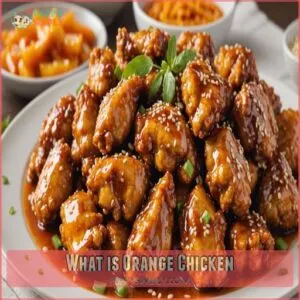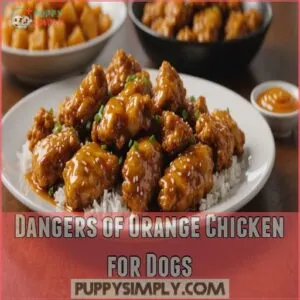This site is supported by our readers. We may earn a commission, at no cost to you, if you purchase through links.

This dish is loaded with high sugar and fat levels, not to mention those sneaky toxic ingredients like garlic and scallions which can be harmful to dogs.
Eating something like this might lead to digestive troubles or even pancreatitis.
So, while your dog might beg with those puppy eyes, it’s best to serve them safer, dog-friendly treats instead. If pup’s happened to grab a bite, monitoring them closely might just be a lifesaver.
Table Of Contents
- Key Takeaways
- What is Orange Chicken
- Dangers of Orange Chicken for Dogs
- Health Risks of Feeding Orange Chicken to Dogs
- What to Do if Your Dog Eats Orange Chicken
- Safe Alternatives to Orange Chicken for Dogs
- Frequently Asked Questions (FAQs)
- Can dogs eat orange chicken?
- Are oranges safe to eat?
- Can dogs eat fruits & vegetables?
- Can dogs eat cranberries?
- Can dogs have a piece of orange chicken?
- Is orange ok for dogs?
- Can I give my dog teriyaki chicken from panda?
- Can dogs have teriyaki chicken?
- Can a puppy have a small bite?
- Are there any benefits for dogs?
- How does orange chicken affect allergies?
- Is the sauce alone dangerous for dogs?
- How does orange chicken compare to other meats?
- Conclusion
Key Takeaways
- Orange chicken’s high sugar, fat, and toxic ingredients (garlic, onions) are harmful to dogs.
- Feeding your dog orange chicken can cause digestive upset, pancreatitis, and other health problems.
- If your dog eats orange chicken, monitor them closely for symptoms like vomiting or lethargy; contact your vet if you are concerned.
- Choose safer alternatives like plain cooked chicken, dog-friendly fruits and vegetables, or commercial dog treats.
What is Orange Chicken
You’ll find orange chicken at most Chinese restaurants, where bite-sized pieces of battered chicken are fried until crispy and coated in a sweet-tangy sauce made from orange juice, soy sauce, and spices.
While you might love this popular takeout dish, it’s important to know what’s in it before sharing any with your four-legged friend.
Ingredients in Orange Chicken
Behind that tempting aroma of orange chicken lurks a combination of ingredients that might make your pup’s tummy do backflips.
This popular Asian dish packs quite a punch with its flavor-packed ingredients.
You’ll want to know what’s in that takeout box before sharing with your four-legged friend, especially since some components can spell trouble for your dog’s health.
- Sweet orange juice concentrate mixed with tangy vinegar for that signature citrus kick
- Savory soy sauce loaded with sodium and seasonings
- Fresh ginger and garlic, which can be toxic to dogs
- Spicy chili flakes and aromatic sesame oil
- Sugar and cornstarch for that thick, glossy sauce coating
Cooking Process of Orange Chicken
From kitchen to table, orange chicken transforms through a multi-step cooking dance.
You’ll start by marinating bite-sized chicken pieces before coating them in a crispy batter mixture, a process that can be enhanced with dog orange chicken treats from dog orange chicken products.
Next comes the sizzling deep-frying process that turns the breading golden brown.
Popularity of Orange Chicken
Orange chicken has become the darling of American Chinese cuisine, lighting up taste buds at countless restaurant chains like Panda Express.
You’ll find this sweet and tangy dish stealing the spotlight on dinner tables nationwide, whether it’s takeout or homemade versions.
Its irresistible combination of crispy chicken and zesty orange sauce has even inspired home cooks to whip up their own interpretations, making it a true fast-food phenomenon.
Dangers of Orange Chicken for Dogs
Some human foods, including those with high salt content like hot dogs and dogs, can be toxic to your dog. While you might be tempted to share your favorite takeout with your furry friend, orange chicken contains several ingredients that can harm your dog’s health.
From its sugary sauce and toxic seasonings to dangerous oils and high salt content, this popular dish can trigger problems ranging from upset stomachs to serious conditions like pancreatitis in your canine companion.
High Sugar Levels
The sweet sauce in your takeout might taste heavenly, but it’s a sugar bomb that can wreak havoc on your furry friend’s health.
While you’re thinking about sharing that sticky-sweet orange chicken, consider how those sugary levels can impact your dog’s wellbeing. You wouldn’t want your best friend developing dog diabetes or dealing with dental issues!
- Sugar rushes lead to energy crashes, making your pup feel sluggish
- Excess sugar contributes to tooth decay and painful dental problems
- Regular sugar consumption can trigger weight gain and obesity
- High sugar intake increases the risk of developing canine diabetes
Toxic Spices and Seasonings
Speaking of ingredients that’ll make your pup’s tummy do backflips, those tasty seasonings in orange chicken pack a dangerous punch.
You’ll find garlic and onions lurking in that sauce, which can damage your dog’s red blood cells.
MSG and chili peppers might give the dish its kick, but they’re no friend to Fido’s digestive system.
Even common ingredients like black pepper and scallions can spell trouble for your four-legged friend.
Harmful Oils and Fats
While spices can upset your pup’s tummy, those deep-fried dangers pack an even bigger punch.
Your furry friend’s pancreas wasn’t built for the fatty overload in orange chicken.
Just like that friend who can’t handle greasy food, dogs struggle with deep-fried delights.
- Deep frying creates unhealthy trans fats that can trigger pancreatitis
- Restaurant-style cooking oils are too rich for your dog’s digestive system
- These fats can lead to weight gain and long-term health complications
Salt Poisoning
Oils and fats aren’t the only villains in orange chicken.
Let’s talk about a silent threat: salt poisoning.
Your furry friend’s body isn’t built to handle high sodium diets.
Too much salt can lead to excessive thirst, confusion, and even seizures.
It’s like turning your pup into a canine pickle – not a pretty sight!
Keep an eye out for these salt toxicity red flags and stick to dog-friendly treats instead.
Pancreatitis
The high-fat content in orange chicken can lead to pancreatitis in dogs.
This serious condition occurs when the pancreas becomes inflamed, causing symptoms like vomiting, diarrhea, and abdominal pain.
Your furry friend’s diet plays a vital role in preventing pancreatitis.
Stick to dog-friendly foods and avoid high-fat treats.
If you suspect pancreatitis, consult your vet immediately.
Remember, a healthy pup is a happy pup!
Health Risks of Feeding Orange Chicken to Dogs
You might think sharing a tasty bite of orange chicken with your furry friend is harmless, but it can lead to serious health issues for dogs.
From digestive problems to potential allergic reactions, feeding your pup this popular dish could result in a not-so-fun trip to the vet.
Digestive Problems
Your furry friend’s tummy is on the line regarding orange chicken. Let’s chew over the digestive drama it can cause: Orange chicken’s ingredients, like chicken, can be a common food allergen that triggers digestive issues in some dogs.
- Gut-wrenching discomfort
- Nutrient absorption nightmares
- Imbalanced gut flora frenzy
- Potential long-term digestive damage
Orange chicken’s spicy, fatty, and sugary nature can wreak havoc on your pup’s delicate digestive system. It’s like sending a bull into a china shop – chaos ensues! Stick to dog-friendly foods to keep your pooch’s belly happy and tail wagging.
Gastrointestinal Upset
For our furry friends, orange chicken can be a real gut-wrencher.
You might think you’re treating Fido, but you’re actually setting the stage for a doggy drama in the digestive department.
Let’s break down the tummy troubles:
| Symptom | Cause |
|---|---|
| Vomiting | Spices, garlic |
| Diarrhea | High fat content |
| Dehydration | Excessive salt |
| Lethargy | Overall discomfort |
When your pup accidentally eats spoiled food, like slightly off meat risks, it’s crucial to monitor their health closely. Stick to dog food and bland diets when your pup’s feeling under the weather.
Remember, what’s tasty for you might be trouble for your four-legged companion!
Intestinal Blockages
Chowing down on orange chicken might seem harmless, but it’s no picnic for your pup’s digestive system.
Cooked bones can splinter, causing intestinal blockages that’ll have your furry friend howling in pain.
Symptoms include vomiting, constipation, and loss of appetite.
To prevent this gut-wrenching scenario, keep that takeout container out of Fido’s reach.
If you suspect a blockage, don’t wait – scoot to the vet pronto for swift treatment.
Allergic Reactions
Some dogs might be barking up the wrong tree with orange chicken.
Allergic reactions can turn your pup’s dinner into a real doggie drama.
While rare, chicken allergies in dogs do exist, and the spices in orange chicken can make matters worse.
Keep an eye out for these telltale signs:
- Itchy paws that make your pooch do the scratch dance
- Ears redder than a fire hydrant
- Tummy troubles that’ll have you both running to the backyard
- Sneezing fits that sound like doggy Morse code
Long-term Health Consequences
Regularly indulging your furry friend in orange chicken can lead to a buffet of health issues.
You might be biting off more than you can chew with obesity, diabetes, and liver disease on the menu.
Don’t let those puppy dog eyes fool you – joint problems and dental issues are no walk in the park either.
And even novelty items like orange chicken dog gear might be a distraction from the real risks.
Keep your pup’s tail wagging by sticking to a balanced diet and saving the takeout for yourself.
What to Do if Your Dog Eats Orange Chicken
If your furry friend has sneaked a bite of orange chicken, don’t panic – but do stay alert.
Keep a close eye on your pup for any unusual symptoms, and if you’re worried, it’s always best to give your vet a quick call for some personalized advice.
Monitoring for Symptoms
Your furry friend just snuck a bite of orange chicken? Don’t panic, but keep your eyes peeled.
Watch for these tell-tale signs:
You can find out more about dog-safe orange products if you’re worried about your pup’s orange intake.
Upset tummy: Vomiting or diarrhea might make an unwelcome appearance.
Couch potato syndrome: Unusual lethargy could signal trouble brewing.
Picky eater act: Sudden appetite loss or increased water intake are red flags.
Remember, you’re the best judge of your pup’s behavior. If something seems off, trust your gut – it’s better to be safe than sorry!
Seeking Veterinary Care
Don’t bark up the wrong tree when your pup scarfs down orange chicken.
If they’ve gobbled more than a bite or two, it’s time to dial up the vet.
Emergency vet visits might seem costly, but they’re a small price for peace of mind.
Pack your pooch’s info and head out.
Remember, pet insurance can be a lifesaver for unexpected vet costs.
Better safe than sorry regarding potential dog food allergies!
Treating Mild Symptoms
In the face of mild symptoms, you can play nurse to your furry friend.
If your dog’s symptoms persist, it could be caused by various factors, including stress and anxiety in dogs, and they need extra care.
Keep a watchful eye on your pup and offer some TLC. Here’s what you can do:
- Serve a bland diet of boiled chicken and rice to soothe their tummy
- Make sure they stay hydrated with plenty of fresh water
- Give them extra rest and cuddles while their body recovers
Remember, time is often the best medicine. If symptoms persist, don’t hesitate to call the vet.
Preventing Future Incidents
Once you’ve dealt with the orange chicken fiasco, it’s time to puppy-proof your kitchen.
Keep those tasty human food dangers out of reach.
Explore safe snack options like carrots or apples.
Remember, smart dog food choices are key.
Try this treat alternative: freeze some low-sodium chicken broth in ice cube trays.
Your furry friend will think it’s the best thing since sliced bread – and it’s way safer!
Safe Alternatives to Orange Chicken for Dogs
You don’t have to disappoint your furry friend when you’re craving orange chicken.
There are plenty of safe, tasty alternatives that’ll make your dog’s tail wag just as much, without the health risks.
Plain Cooked Chicken
For safe alternatives, plain cooked chicken is your pup’s best friend.
Boil or steam it without oils, seasonings, or sauces for a healthy treat.
This lean protein packs a nutritional punch, supporting muscle growth and providing essential amino acids.
Remember, moderation is key – even good things can be too much of a treat!
Aim for small portions as part of a balanced diet.
Your furry friend will thank you with tail wags and sloppy kisses!
Dog-Friendly Fruits and Vegetables
Plain chicken’s great for pups, but what about fruits and veggies?
Dogs enjoy and benefit from many options safe for their diets.
Consider these alternatives:
- Apples: A crunchy treat that’s full of fiber.
- Carrots: Low in calories, high in crunch.
- Blueberries: A sweet burst of antioxidants.
- Green beans: Low-calorie and high in vitamins.
These popular choices keep tails wagging!
Commercial Dog Treats
Choosing safe commercial dog treats over orange chicken is a wise move.
These treats prioritize quality ingredients, making sure your pup stays happy and healthy.
Always check reviews and vet-recommended brands to make sure treat safety.
| Brand | Ingredients | Quality Rating |
|---|---|---|
| Brand A | Chicken, Rice | High |
| Brand B | Salmon, Peas | Medium |
| Brand C | Beef, Carrots | High |
| Brand D | Lamb, Sweet Potato | Medium |
| Brand E | Turkey, Blueberries | High |
Homemade Dog Treats
Whipping up homemade dog treats is an alternative safe haven for your pup.
Try these four delightful recipes:
- Peanut Butter Biscuits: Mix whole wheat flour, peanut butter, and eggs.
- Banana Oat Cookies: Combine bananas, oats, and a touch of honey.
- Chicken Chews: Use shredded chicken with rice.
- Pumpkin Bites: Stir canned pumpkin with coconut flour.
Frequently Asked Questions (FAQs)
Can dogs eat orange chicken?
Feeding dogs orange chicken is like playing with fire—it’s delicious but dangerous.
The dish contains harmful ingredients like garlic, spices, and high sugar levels, causing potential digestive issues, obesity, or even severe health problems.
Stick to safe treats.
Are oranges safe to eat?
Oranges are generally safe, but moderation’s key! Too much sugar can upset tummies. Peel them first; the rind isn’t digestible. Enjoy, but don’t go overboard!
Can dogs eat fruits & vegetables?
Imagine your pup as a veggie-loving connoisseur!
Dogs can savor fruits like apples and blueberries or veggies like carrots and green beans.
Just skip grapes, onions, and garlic—they’re like kryptonite for canine tummies.
Always moderate portions!
Can dogs eat cranberries?
Yes, dogs can eat cranberries in moderation.
These tangy treats offer some vitamins and antioxidants.
Just avoid sugary cranberry sauces or juices.
Too many cranberries might cause tummy troubles, so keep portions small to play it safe.
Can dogs have a piece of orange chicken?
Giving your dog orange chicken is like letting a kid run loose in a candy store—fun at first, but not healthy.
Its high sugar, salt, and spice content can upset their stomach or worse.
Is orange ok for dogs?
Oranges aren’t harmful to dogs in small amounts.
They offer vitamin C, but their high sugar content can upset your pup’s stomach if consumed too much.
Always remove seeds and peels to prevent any digestive issues.
Can I give my dog teriyaki chicken from panda?
You shouldn’t give your dog teriyaki chicken from Panda Express.
It’s too salty and sugary for dogs, with ingredients like soy sauce that can upset their stomachs.
Opt for plain cooked chicken instead for a safer treat.
Can dogs have teriyaki chicken?
Hark, friend! Teriyaki chicken’s a no-go for your pup. The high sodium and potential for garlic or onions make it risky. Stick to plain cooked chicken; it’s much safer.
Can a puppy have a small bite?
Puppies have delicate tummies, so even a small bite of rich foods like orange chicken might upset things.
Stick to safe treats like plain boiled chicken or commercial puppy snacks.
Keep an eye on any unusual symptoms.
Are there any benefits for dogs?
Feeding dogs orange chicken isn’t advisable, as it lacks benefits and poses health risks, similar to the risks associated with feeding dogs high-fat chorizo snacks, which can lead to digestive issues and pancreatitis. Feeding dogs orange chicken isn’t advisable, as it lacks benefits and poses health risks.
High sugar, salt, and spices can harm a dog’s digestion.
Instead, opt for plain cooked chicken or vet-approved treats for a happy pup!
How does orange chicken affect allergies?
Imagine your dog munching on orange chicken, which might trigger allergies like a sudden sneezing fit.
The spices and garlic could irritate the skin or gut, causing discomfort.
It’s best to keep this treat out of reach.
Is the sauce alone dangerous for dogs?
Yes, the orange chicken sauce is dangerous for dogs.
It contains garlic, sugar, and high salt levels, which can cause stomach upset, dehydration, and even sodium poisoning.
Always keep such spicy, sugary sauces away from pets.
How does orange chicken compare to other meats?
When you compare orange chicken to other meats for dogs, it’s a big no-no.
While plain meats like chicken or beef are generally fine, orange chicken’s sugar, spices, and sauces spell trouble for your furry friend.
Conclusion
Imagine your dog sneaking a bite of orange chicken at a party—seems harmless, right?
But can dogs eat orange chicken safely?
Not really.
The dish’s high sugars, fats, and toxic ingredients make it risky for dogs, leading to possible digestive issues or pancreatitis.
Instead, offer safer, dog-friendly snacks.
Keep an eye on them if they accidentally consume any orange chicken, and don’t hesitate to seek veterinary advice if needed.
Your pet’s health is the top priority.














